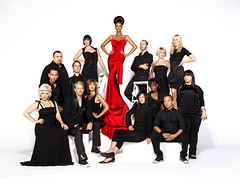Penmachine
19 February 2009
A bit of a shock
 Our friend Kim is one of the designers competing on this season's Project Runway Canada, so we've been watching the show since it started a few weeks ago. It was filmed last summer in Ottawa. At the end of this Tuesday's episode, I was shocked to see an announcement that one of the designers, Danio Frangella (who left during the first episode because of health complications) died last week of cancer. He was 34.
Our friend Kim is one of the designers competing on this season's Project Runway Canada, so we've been watching the show since it started a few weeks ago. It was filmed last summer in Ottawa. At the end of this Tuesday's episode, I was shocked to see an announcement that one of the designers, Danio Frangella (who left during the first episode because of health complications) died last week of cancer. He was 34.
He was not in good shape during that first episode, because he'd been undergoing cancer treatment for seven years, and had trouble walking because of his leg ulcers. Learning that he had died gave me a chill, because of course I have cancer too, and have had it for a couple of years now. Indeed, this week it is exactly two years since I began my medical leave from work. Two years!
If you haven't had cancer or known someone with it, you tend to assume that once someone gets it, they either get treated and go into remission (or are cured), or they die pretty swiftly. Those aren't the only alternatives. Many people live with the disease for years, sometimes decades, undergoing treatments and adjusting their lives around their symptoms and side effects. Danio was one of those, and so am I.
Even successful treatments may not be what you expect. Most statistical studies look at cancer treatments as successful if their subjects are still alive after five years—you often see "five-year survival rates" in such studies. I suppose that's fine if you're a researcher, or if you're a cancer patient in your 70s or 80s.
But if you're not yet 40, like me, or like Danio, five years isn't a very long time. I have a decent chance of surviving five years past my diagnosis, but that's not enormously encouraging, not when most people my age are thinking ahead a lot more than five years. I'm already almost half-way to the five-year mark. All the medications I've taken since 2007 haven't done what they really need to do, which is stop or reverse the nine small metastatic tumours still growing (slowly) in my lungs. On the other hand, I've also already lived longer than a lot of people diagnosed with my sort of aggressive colon cancer do.
One of the first things my gastroenterologist Dr. Enns told me back in '07 is that while there are tons of statistics out there on cancer survival rates, no one person is such a number, and the statistics can't predict how one person's disease will progress, or how long they will live. Just yesterday my oncologist Dr. Kim noted that research shows physicians to be notoriously poor at predicting life expectancy for cancer patients—no better than patients do ourselves, and in many cases no better than a wild guess.
As I wrote recently, I have "months certainly, years quite possibly" to live. How many years, I don't know. Nobody knows. Will I see my kids graduate from high school, or reach my 20th wedding anniversary with my wife in 2015? It's possible, but unless a new treatment starts working, or I go into remission because of lifestyle changes or another reason in that time, it may not be likely.
Then again, some people die young in car crashes or for other reasons, never anticipating their last day, or their last minute. If I'd been born 100 years ago, I would probably have died in my early 20s from diabetes, and might never have married or had children, or even seen a website, let alone built one like this. And if I lived in Swaziland (where 38% of adults have AIDS) or Afghanistan (with astronomical rates of infant mortality), even today, I'd be at the end of the average male life expectancy already.
Here, I am lucky to have a wonderful family, and support, and great health care, and I can still choose to live, to enjoy it, to write what you read, and to make my life as long and happy as I can.
Labels: cancer, chemotherapy, death, diabetes, family, television
Comments:
To write. To create music. To simply live a bit more creatively.
Your writing is succinct, your music is uplifting and your portrayal of daily family life, well, it makes me a small bit envious but a huge lot happy, happy, happy for you!
You're an awesome fellow and I count myself lucky that I got to know/work with you, if even for a short time.
You're The Guy!
To my anonymous cousin that wrote in,, I thank you.
wishing you the very best Derek
Sandi Frangella


